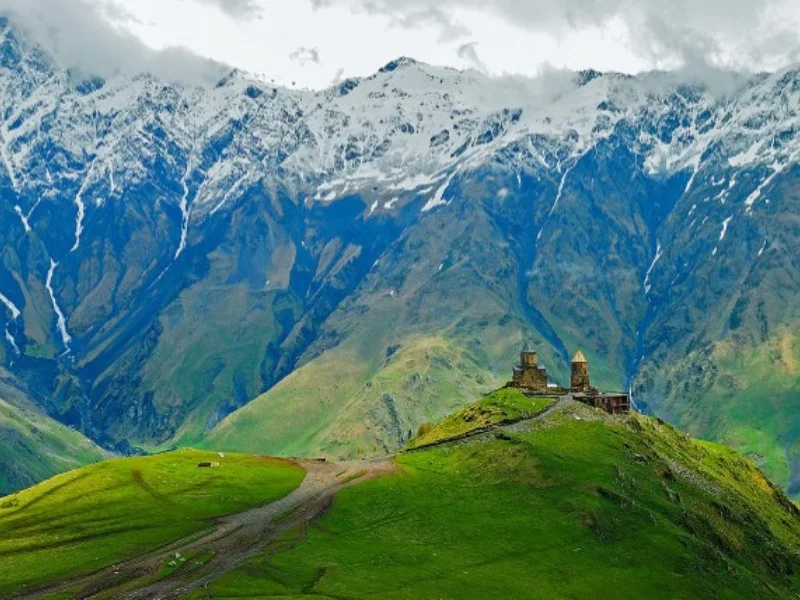History of Bursa for Tourist and Traveler ( Get to Know Bursa Up Close)
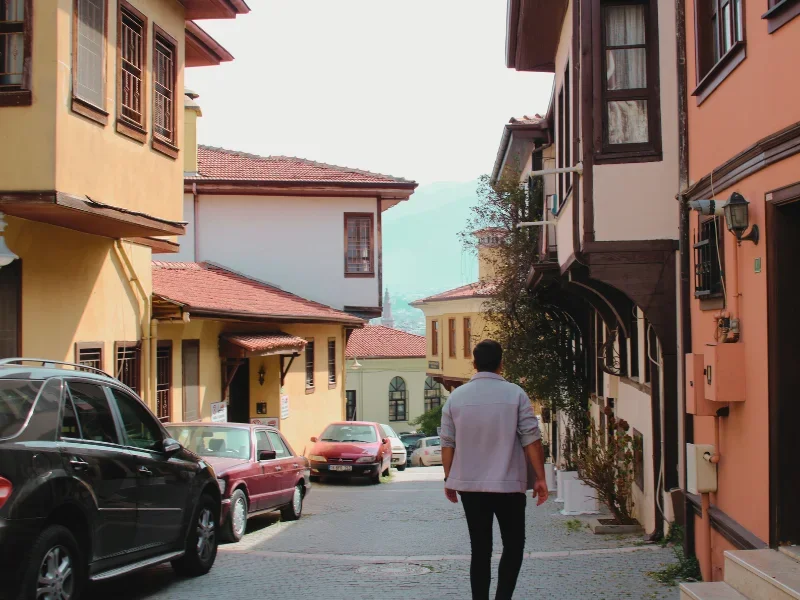
Merhaba and welcome! I’ve been living in the beautiful city of Bursa, Turkey for almost 20 years, and whenever I get the chance, I love to explore the world. In this guide, I’m sharing my personal tips and insights for first-time visitors to Bursa, or anyone who wants to get to know this amazing city better. Instead of overwhelming you with long, boring details, I’ll focus on the most important things you need to know about Bursa. By the time you finish reading, you’ll have a solid understanding of what this city has to offer.
What Kind of a City is Bursa?
Bursa is characterized by its mix of history and natural beauty. The old streets, mosques and hans reflect the historical side of the city, while the rise of modern buildings and shopping malls show the rapid growth and development. Uludag, a massive mountain, looms over the city – always visible but far away. The green spaces provide a breath of fresh air, while the busy traffic and crowds in the city center reflect its rapid growth. Bursa is a city where history and modernity meet, a city that is growing fast but still holding on to its roots.
Is Bursa a Safe City?

Bursa is generally considered a safe city. Like any other city, there may be occasional challenges, especially for tourists. When visiting Bursa, you’ll likely want to stay close to the city center. I recommend staying in one of the modern districts, like Nilufer, and using public transportation like the metro or bus to reach the city center. This is a safe and convenient way to travel. After reading this, you’ll have a better understanding of what to expect in Bursa and how to explore the city more confidently.
What is the Weather Like in Bursa?
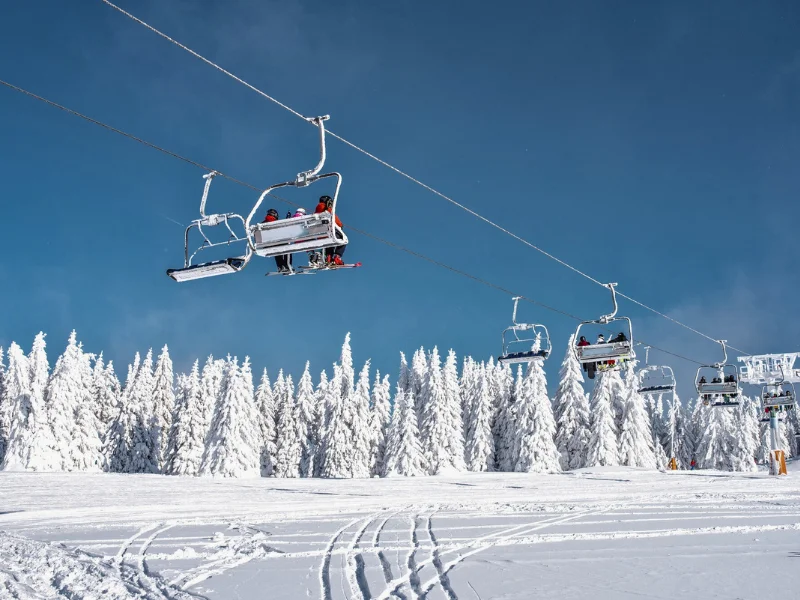
In Which Region of Turkey Is Bursa Located?
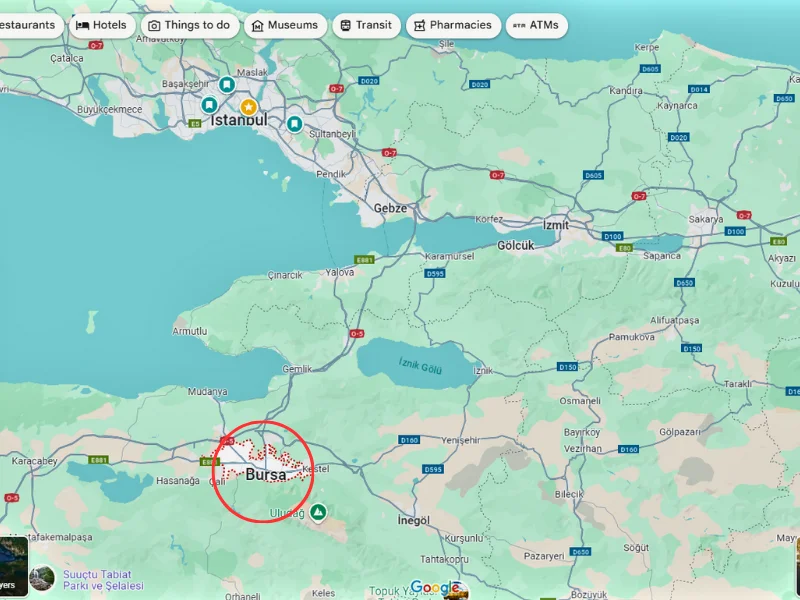
Bursa Is Known as "Green Bursa" Because of Its Location at the Foot of Uludag Mountain.
Bursa is a city located in the foothills of Uludag mountain, known for its lush greenery and often referred to as “Green Bursa”. However, as someone who has lived here for years and is a nature lover, I must say that the city is growing rapidly. Skyscrapers are being built, the population is increasing rapidly and traffic is becoming more of a problem. However, if you venture to the foothills of the mountain, you can still enjoy some breathtaking views.
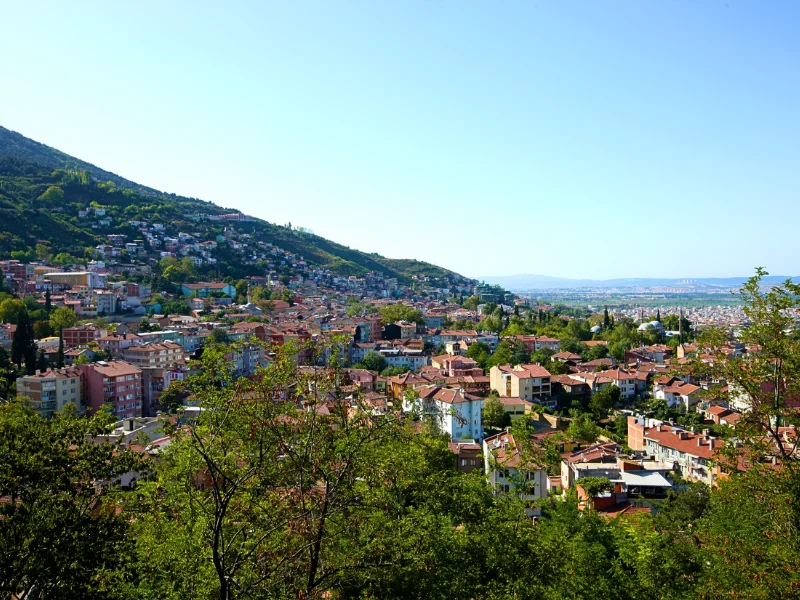
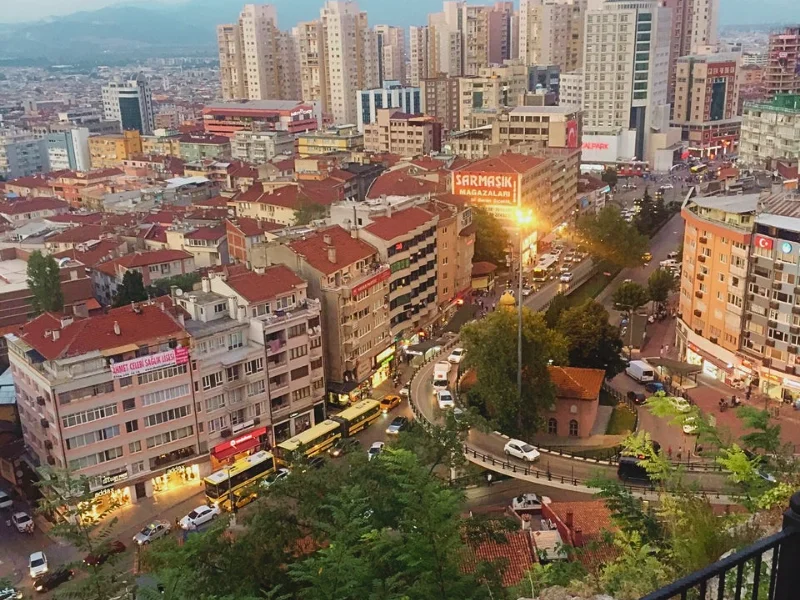
When you look towards the city center of Bursa, you might wonder why these tall buildings are there. I’ve been wondering the same thing for 20 years.
Bursa's History Goes Back 8,500 Years
With a history dating back 8,500 years to the Neolithic period, Bursa has been influenced by many civilizations. During the Roman and Byzantine periods, it became an important settlement. In 395 A.D., it came under Byzantine control, and in the 500s it was known for silk production and thermal baths. The Turks began to settle in the region after 1080, and in 1326 Bursa became the first capital of the Ottoman Empire. Uludag Mountain, once an important religious center during the Christian era, also played an important role.
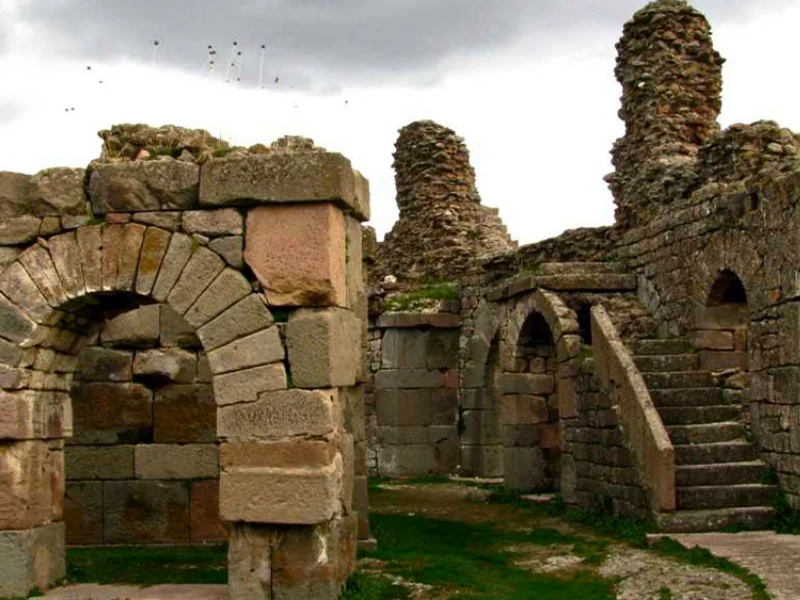
If you’re planning to visit Bursa and want to explore its historical ruins, here’s a list of recommended sites I’ve compiled for you. These places offer a glimpse into the city’s rich history and cultural heritage.
| Site | Description | Period |
|---|---|---|
| Bursa Archaeology Museum | Artifacts dating back to the Neolithic and Chalcolithic periods, showcasing settlements from as far as 8,500 years ago. | Neolithic, Chalcolithic |
| Tirilye (Zeytinbagi) Ancient City | Ruins from the Hellenistic, Roman, and Byzantine periods, with traces of earlier settlements from the Meso and Early Iron Ages. | Hellenistic, Roman, Early Iron Age |
| Kizilkaya Mound | Artifacts from the Hittite period, including foundations of ancient settlements and daily life objects. | Hittite Period |
| Bursa Mounds | Neolithic period settlements and structures, with some dating back to 3000 BC. | Neolithic |
| Cemalettin Huseyin Hill | Ancient settlement ruins dating back to 1200 BC, with Frigian period remnants. | Frigian Period |
| Uludag Monasteries and Churches | Religious centers from the early Christian period, with ruins of monasteries and churches built on Uludag. | Early Christian Period |
Bursa is the First Capital of the Ottoman Empire
Bursa, the first capital of the Ottoman Empire, is of great historical importance. Captured by Orhan Gazi in 1326, it played a crucial role in the expansion of the empire. In Bursa, you’ll find the tombs of both Osman Gazi and Orhan Gazi. Osman Gazi’s Tomb and Orhan Gazi’s Tomb are important landmarks in the city’s rich historical landscape. These tombs not only represent the early years of the Ottoman Empire, but also reflect the cultural and religious heritage of the city, making Bursa a must-visit destination for history enthusiasts.
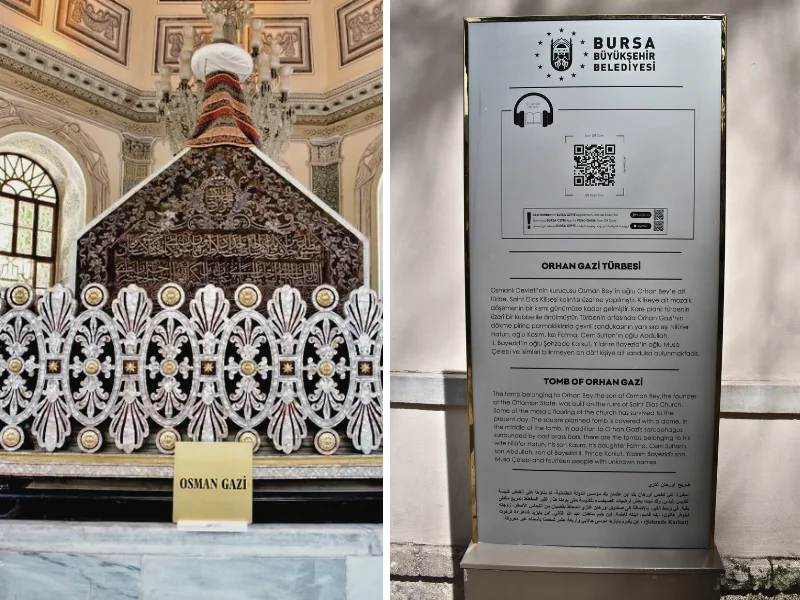
The Osmangazi and Osmangazi Tombs open at 9 AM and close at 6 PM.
Bursa Was Besieged and Lost in the 1920s.
In the 1920s, due to the ongoing war within the Ottoman Empire, Bursa was lost to the Greek forces. This event was met with deep sorrow in Turkey. After the collapse of the Ottoman Empire, the Republic of Turkey was established and Turkish forces retook Bursa. Mustafa Kemal Ataturk, the founder of the Republic of Turkey, played an important role in this strategic move. In the city, there is a large statue of Ataturk in the main square and the area is named “Heykel” (Statue) in his honor. Ataturk also has a villa in Bursa, which is now a museum.
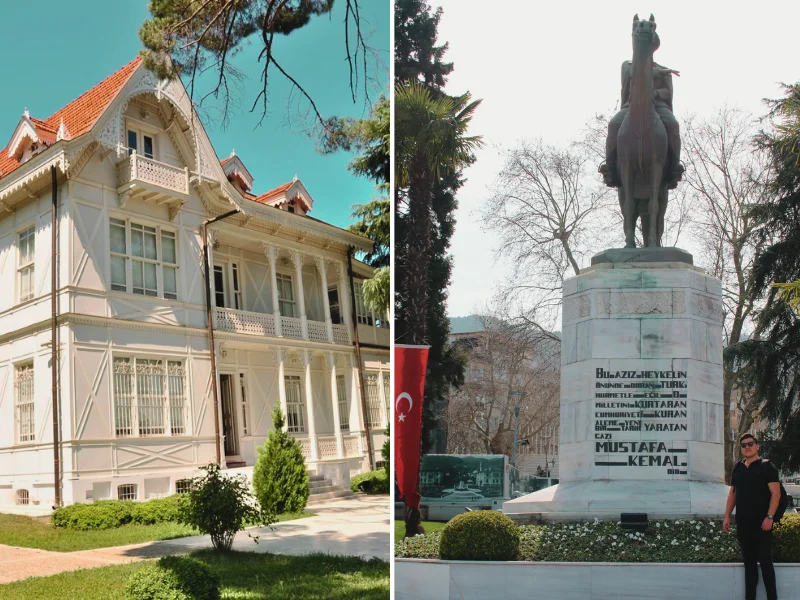
The Ataturk House Museum is closed on Mondays and open on the other six days of the week. It opens at 8 am and closes at 5 pm. A museum card is required to visit the museum.
An Overview of Historical Sights in Bursa
As a tourist visiting Bursa, you’ll probably spend most of your time in the city center, as it’s the heart of the city’s foundation and home to many historical landmarks. My advice is to use your time wisely and make sure you take time to explore the other districts of Bursa. Each has its own unique charm and history.
I have made a list of the most beautiful places to see in Bursa so that you can use your time in the most efficient way.
| Location | Description |
|---|---|
| Bursa City Center | The city center is home to several Ottoman-era landmarks including inns, mosques, mausoleums, madrasahs, baths, Bursa Castle, and museums, showcasing the city’s rich history. |
| Iznik | Bursa boasts a fascinating history, having been home to the Romans, Byzantines, Seljuks, and Ottomans over thousands of years. The city is famous for its stunning ceramics, which can be found throughout. Iznik, in particular, offers beautiful natural landscapes, including a magnificent lake that is perfect for nature lovers. |
| Cumalikizik Village | This village, dating back to the Ottoman era, remains well-preserved and is listed as a UNESCO World Heritage site. |
| Mudanya | Located on the coast of Bursa, Mudanya is where you’ll arrive if traveling by sea. It’s home to historical Greek houses and unique structures, making it a charming area to explore. |
| Nilufer | Nilufer is the most modern part of Bursa, offering a mix of urban life and natural beauty. I highly recommend visiting the village of Golyazi, known for its charming buildings, churches, and a stunning lake. |
| Uludag Mountain | Don’t miss a trip to Uludag Mountain. Take the cable car for an unforgettable bird’s-eye view of the city and the surrounding natural beauty. |
Bursa Trading From Past to Present
Bursa, once the first capital of the Ottoman Empire, has long been an important commercial center. The city played an important role in the production of silk, textiles and ceramics and contributed significantly to both domestic and international trade due to its strategic location on the Silk Road. Today, Bursa is known for its strong industrial base, particularly in the automotive sector, which is an important part of the Turkish economy. The city is also home to Turkey’s first and only automobile museum. With industries such as textile manufacturing and automotive production, Bursa continues to be an important hub for both domestic and global trade.
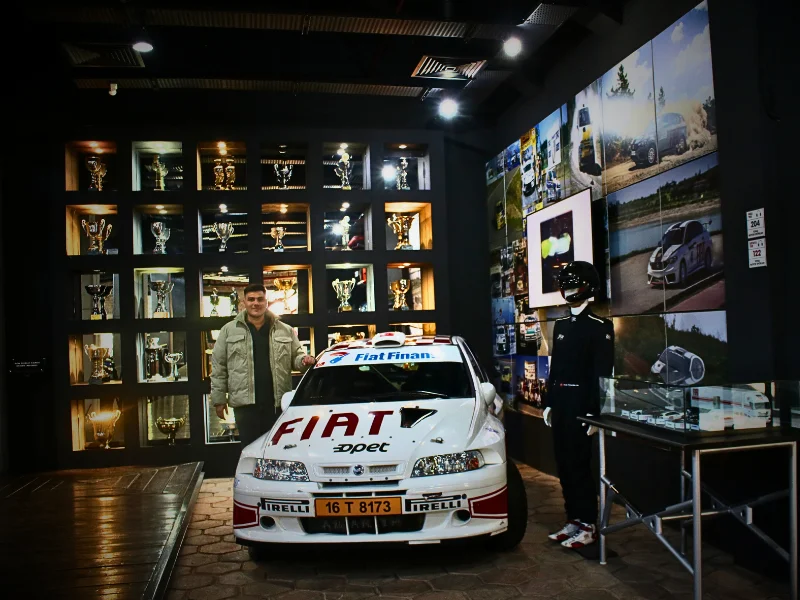
The Cuisine and Dishes of Bursa
Bursa’s food culture reflects the city’s rich history and cultural diversity. As the former capital of the Ottoman Empire, Bursa was a crossroads for various civilizations, which greatly influenced its cuisine. Over the centuries, traditional Ottoman dishes and local flavors became unique to the city. One of the most famous dishes is Iskender Kebab, a signature of Bursa’s culinary heritage. Additionally, desserts like Kemalpasa and savory snacks like Cantik are part of the city’s unique food culture. Bursa’s cuisine has been enriched through centuries of trade and cultural exchange, preserving traditional flavors to this day.
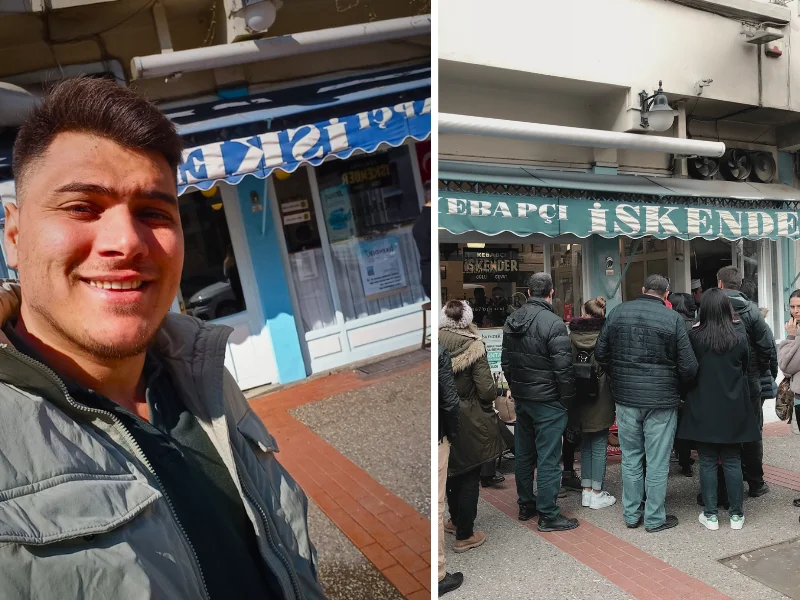
The Hammam (Bath) Culture is Very Popular in Bursa
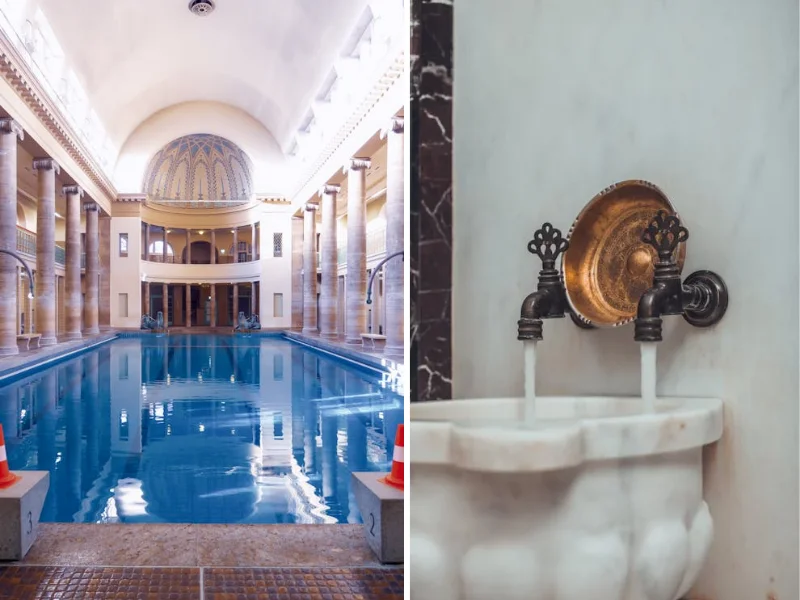
Bursa’s bathing culture is a deep-rooted tradition that dates back to the Ottoman Empire. The city’s historic hammams (Turkish baths) were not only places of cleanliness, but also social gathering places. These baths offer visitors an opportunity to relax, unwind and socialize. With their unique architecture and traditional services, Bursa’s hammams offer a cultural experience and a glimpse into the city’s history. I highly recommend a visit to Bursa’s baths as they’re beneficial to your psychological, mental and physical well-being.
The People of Bursa Love to Go to the Theater
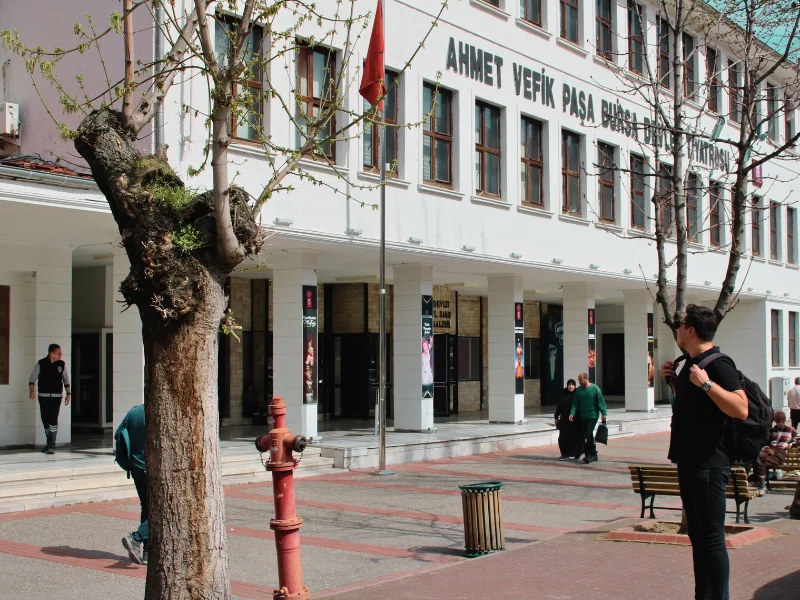
Bursa is a city with a rich cultural heritage, and theater plays an important role in this legacy. From the Ottoman era to the present day, the city has embraced the art of theater and made significant progress in this field. Bursa hosts both traditional and modern theatrical performances. Theater events in the city are an essential part of its vibrant cultural scene. One of the city’s key institutions is the Bursa State Theater, which is worth visiting. I highly recommend catching a performance there – it will add meaning to your trip and give you a deeper insight into the local culture.
At Bursa State Theater, ticket prices are very affordable, typically ranging from around 1 to 2 dollars. You can follow the theater performances here for an excellent cultural experience at a budget-friendly price.
The Iconic Landmarks That Come to Mind When You Think of Bursa
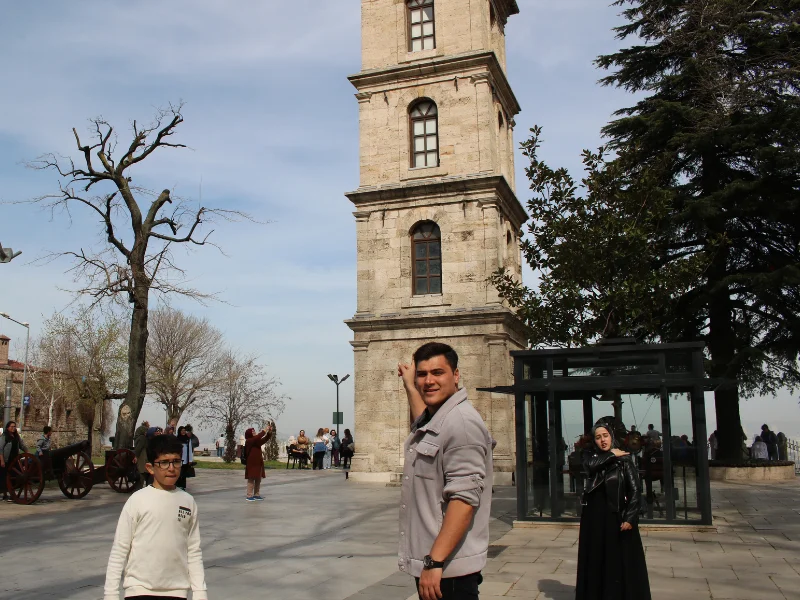
Bursa is known for several iconic landmarks that are deeply intertwined with its identity, each with a rich historical significance. These landmarks not only represent the city’s cultural heritage, but also offer a glimpse into its storied past.
| Iconic Landmark | Description |
|---|---|
| Tophane Clock Tower | Built in 1905, this tower once served both as a fire tower and a clock tower. It stands 33 meters tall. |
| Historic Municipality Building | Inaugurated in 1880, this building is one of the oldest municipal buildings in Turkey, featuring a blend of traditional and modern architectural styles. |
| Karagoz Monument | This monument honors the iconic Turkish shadow puppetry characters Karagoz and Hacivat. In 2009, Karagoz was declared UNESCO Intangible Cultural Heritage. |
| Osmanli Street (Kale Street) | A nostalgic street in the Hisar district, known for its historical Ottoman architecture and as a prime photography spot in Bursa. |
| Orucbey Street | One of Bursa’s oldest streets, showcasing the historic fabric of the city with its traditional architecture and open-air museum atmosphere. |
| Sumbullu Bahce Mansion | Located in the Hisar District, this mansion, built in the 1920s, combines Baroque and National Architectural styles and offers a unique insight into Bursa’s history. |
Before you travel to Bursa, I’ve provided some useful information to help you get a feel for the city. If you’re planning a day trip from Istanbul to Bursa, check out my article on what to do in Bursa in one day (Istanbul to Bursa day trip). Additionally, if you’re travelling to different countries or cities, my guide on how to find cheap air tickets will offer budget-friendly solutions.
Most Read Articles
My Recommended Articles

